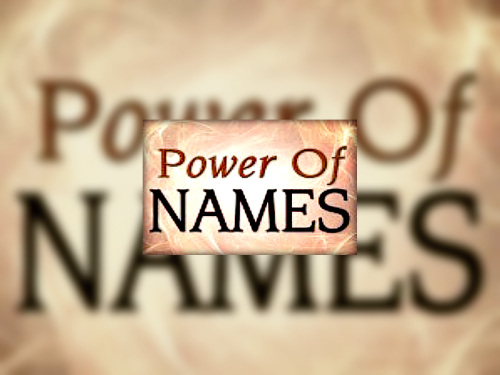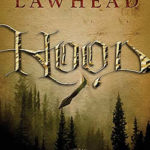A Superstition Transformed
Outstanding among those beliefs that are universally characteristic of the religion of superstition is the conviction that “a man’s name is the essence of his being” (one Hebrew text says “a man’s name is his person” and another, “his name is his soul”). Joshua Trachtenberg, Jewish Magic and Superstition
There’s an old superstition that names are powerful. Many cultures have believed that to know a person’s name is to have power over him, or to  be freed from his power. The principle has been extended to the supernatural, with people seeking to conjure up the power of gods, angels, and demons by invoking their names.
be freed from his power. The principle has been extended to the supernatural, with people seeking to conjure up the power of gods, angels, and demons by invoking their names.
Like all superstitions, this one shows both fear and a desire to control. Magic, real magic, has made great use of it; sorcerers, too, believed in the power of names. From the eleventh century come reports of witnesses – “learned and trustworthy men” – who claimed “that they had themselves seen magicians write names upon reeds and olive-leaves, which they cast before robbers and thus prevented their passage, or, having written such names upon new sherds, threw them into a raging sea and mollified it, or threw them before a man to bring about his sudden death.”
This idea has endured in folk tales – most famously in Rumpelstiltskin – and is now an established trope in modern fantasy and even, on occasion, sci-fi. Despite its various disreputable associations, it has a presence in Christian fantasy.
So how is a superstition transformed into a staple of fiction? It begins when people stop believing. If you genuinely believe in the mystic power of names, you will take it seriously – hiding your real name like people hide their PIN number, or worrying that you’ll curse your child by giving him an unlucky name. When you stop believing, the fun begins. What in our world would be bad science, or mere superstition, is the operating laws of different worlds. Everyone who reads speculative fiction knows this.
In Andrew Peterson’s Wingfeather Saga, names and their power are at the heart of the story. The villains transform human beings into monsters by melding them with other creatures and then giving them new names. Their old selves are submerged and they become willing pawns for the villains. But unless and until the new name is given, the transformation remains incomplete. The victim’s old self is much closer to the surface and it’s easier for him to come back.
For these people, to hear their true names is painful. But it is also, if they don’t rebel, healing – and not for any magical, other-world reason. Their true names hurt and heal because the hearing reminds them who they were and what they lost; it brings them back to themselves.
The power-of-nam es theme is echoed throughout the saga. A lesser villain calls his enslaved workers ‘tools’ and tells them they have no names; the revolution begins when the workers start to share their names and band together. “What is a real name?” asks one character early on, hinting at hidden names and the truths hidden with them. And through it all the admonition and reminder comes again and again, Remember who you are.
es theme is echoed throughout the saga. A lesser villain calls his enslaved workers ‘tools’ and tells them they have no names; the revolution begins when the workers start to share their names and band together. “What is a real name?” asks one character early on, hinting at hidden names and the truths hidden with them. And through it all the admonition and reminder comes again and again, Remember who you are.
Names, a character within the books says, have power. But it would be more true, even in his own world, to say that names have meaning. A person’s name is representative of his self, and to forget your name is to forget who you are. Unlike the old folk tales, there is no danger in telling others your true name, only in forgetting it yourself; there’s no power in knowing the names of others, only in making them forget their names.
Such subtle alteration is another way to revive and change old myths into new stories. Most legends and fairy tales, along with the fairy tale-worthy superstitions, are open for this sort of reconstruction, pagan origins or no. Have you ever been struck by a story’s transformation of a myth or superstition? Is there a myth or superstition you think ripe for such transformation?
[Note: This post was written for the CSFF Blog Tour of The Warden and the Wolf King, running this week, and is cross-posted to my blog. For full links to the blog tour, visit Rebecca Miller’s site.]










































In the first Guardiansof Ga’Hoole book, the bad guys make the young owls repeat their names over and over until its nothing but meaningless sounds. Then they’re assigned a number, which becomes their real name. During this process, the owls lose their sense of self and become automatons. It’s chilling and thrilling to watch our heroes outwit the bad guys and retain their names.
That’s cool to know that true names are such a staple in fiction. I’m aware of the idea, but I didn’t know they were so prevalent in stories, although I have heard of their inclusion in some books such as the Inheritance Cycle. I was super impressed with their importance in the Tales of Goldstone Wood, namely in Starflower!
This is a great piece of folklore for fantasy. Lewis used it to great effect in The Magician’s Nephew. Also, the philosophical implications of Revelation 2:17 are profound.
I think the sci-fi version of this is perception, like in the TV show Fringe. To be able to see something completely objectively and truthfully would be to have a divine vantage point.
Madeline L’Engle also used it:
From A Wind in the Door